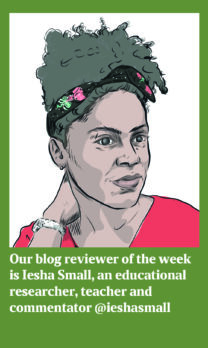Blog reviewer of the week, Iesha Small, shares her top picks from the blogosphere this week.
My shero
@womened
“From our first conversation it was like I had met the person I had been waiting to meet all my life. We ‘clicked’ instantly – I found my soulmate that night.”
No, Schools Week hasn’t started a new romance novels review section; this is a description of the writer’s first meeting with her “shero”, or she-hero.
The team at WomenEd have invited 300-word contributions from anybody to write about women who have inspired them in their lives so far. Sue Cowley chose to write about her best friend of 30 years. It’s wonderful to see close adult relationships celebrated that aren’t between family or partners. Other bloggers have included reflections about mothers, headteachers and former bosses. I also noticed that there were male bloggers who had joined in to write about women who had inspired them: sheroes aren’t just for women and girls.
New year, new school: On making a good start
@Bennewmark
“Before taking over a class I deliberately avoid anything, aside from relevant SEND information, that might make me form prejudices about behavior,” writes Ben Newmark, who started a new job at a new school this term. As somebody who has started three different teaching posts in January of the spring term, I immediately empathised.
In January you have to hit the ground running: there isn’t the honeymoon period that you have in September when everybody else is new or adjusting to a new academic year too.
It’s especially interesting when you start as a head of department or SLT, as I previously have, and staff automatically expect you to know everything because of your position.
This blog is a straightforward walkthrough of what Ben plans to do in his first lesson with each of his classes.
If it were a film, I could imagine the lead character speaking to himself in the bathroom mirror as he prepared to go into work. It’s a very traditional take on a first lesson, which many readers may disagree with, but the point is that it has been planned, it has been thought about and there is a reason for everything.
The bit that really stood out to me was Ben’s statement that he had been forced to think about “how to make the best start with children who do not know me, in a context where I can’t rely on the artificial gravitas a leadership position provides”.
Having worked in five schools in a variety of contexts in my career so far, I’ve noticed that many teachers forget how much of what they consider their good behaviour management is actually related to children’s familiarity, their status in a particular school and their reputation.
Stripped of context and status, it’s useful to think about how we’d each approach a new class and it may help us to approach less experienced, new or temporary, colleagues with compassion.
Teacher Toolkit podcast 2: Sean Morrison
@TeacherToolkit
In this short, 12-minute podcast, Ross McGill, a consultant and former school leader, talks to headteacher Sean Morrison, who recently spent three months in the US on paid sabbatical researching how to improve student outcomes.
Sean is Australian, and it was fascinating to hear him talk about the Australian system, where many schools give heads a two-to-three-month sabbatical after around five years in post. Having worked on two research projects related to recruitment and retention in the English state system in the past year, I’m always interested in how other industries or countries approach workforce issues. I strongly believe that the recruitment issue in teaching is actually a retention issue and sabbaticals could help.
On race, class and intelligence
@DavidMcqueen
“At the core of the British education runs a deep vein of elitism” – and you know that a blog which starts like this isn’t going to be an easy read. Toby Young recently resigned from the Office for Students, shortly after he was linked to a private conference with unsavory links to eugenicists.
This post goes beyond individuals and explores the history of links made between race and IQ. I support free speech but I also agree with McQueen that anybody who makes assumptions about students based “on genetic heritability or physical ability” is unfit to serve in any position related to education.













Your thoughts